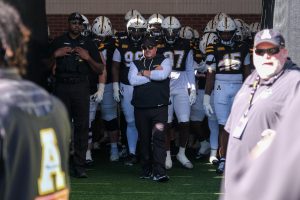App State picks new Quality Enhancement Plan for 2024-2029
App State’s QEP Steering Committee pushes to inform students on climate literacy and response leadership, a movement caused by students’ worry of the future in the current deteriorating climate. Pictured is Boone Fork Trail, on April 20, 2022.
May 12, 2022
App State’s QEP Steering Committee has chosen a new Quality Enhancement Plan for initiation in Fall 2024 and will carry out through 2029.
The selected topic for the QEP is “Climate Literacy and Response-Ability: Cultivating Resilient and Just Communities,” Provost and Executive Vice Chancellor Heather Norris wrote in an email Tuesday.
According to the QEP’s website, the plan serves as an “integral component of the reaffirmation of accreditation process and is derived from an institution’s ongoing comprehensive planning and evaluation processes.”
According to the QEP’s website, the chosen QEP has four main areas in which they plan to develop:
- A solutions-oriented and introductory general education climate literacy course which “can be implemented in departments across campus.”
- Career-oriented and upper-level climate courses “within as many academic units as possible.”
- “Opportunities for students to participate in transdisciplinary climate-related research, creative and scholarly activities.”
- “Co-curricular justice and local-to-global centered engagement events.”
Other plans were proposed through Zoom presentations during the week of April 8, and were given feedback through April 18.
Laura England, a practitioner in residence for Sustainable Development, presented her team’s QEP plan April 12, which was the chosen plan. England said this QEP’s supporting team was made up of more than 30 faculty members from 25 different academic departments.
“We are proposing QEP support to develop and implement a vertical model for climate literacy education that centers climate solutions, justice and resilience and that would make Appalachian a national leader and sustainability pedagogy,” England said during the Zoom presentation.
England said based on scientific evidence regarding climate change, society must “respond urgently to get us on a path to a safe and just climate future” and North Carolina should respond urgently as well.
England also said with a climate literacy QEP, App State community members and students will be able to better understand climate change and sustainability and how they can improve it.
Shea Tuberty, a professor in the Biology Department, discussed some of the QEP work the team plans on initiating.
“We propose to establish a climate in the disciplines program with QEP support to help faculty across campus develop upper level climate courses in as many academic programs as possible,” Tuberty said during the Zoom presentation.
Tracie Salinas, director of the Mathematics and Science Education Center, said by having this QEP incorporated into many different departments, students will have a wider variety of skills for both inside and outside their fields.
“Climate literacy education will give our graduates an edge in securing employment in a wide range of fields post graduation,” Salinas said during the Zoom presentation.
Tuberty said the plan will include a new climate studies prefix course and new video modules highlighting climate expertise in response to climate change at App State.
Tuberty said the proposal also aims to include funding for faculty and staff to offer climate engagement for their students to “deepen their climate understanding” and develop their skills for challenging climate changes outside the classroom.
He said this plan proposes a new climate solutions lab located in the Innovation District to serve as a “convergence space and network hub” for the faculty and staff involved in the curriculum development.
With this proposal, Tuberty said students will have knowledge and skills to lead climate responses in the future in their respective fields or in the community will know how they can respond to climate change as well.
According to a 2021 study of 10,000 people around the world, Salinas said many people ages 16-25 in the U.S. worry about the future because of climate change.
“We will become perhaps the first university to prepare students across all disciplines for a climate disrupted future,” Salinas said. “And we would do so through an empowering approach rooted in climate responses that center justice and resilience.”















